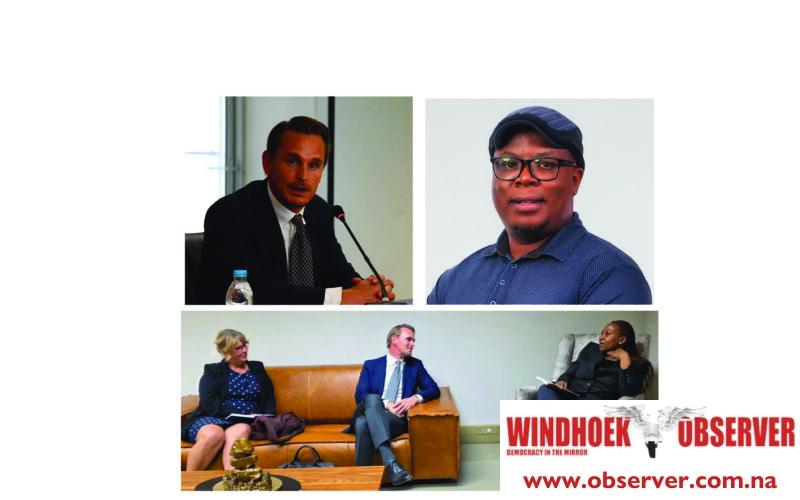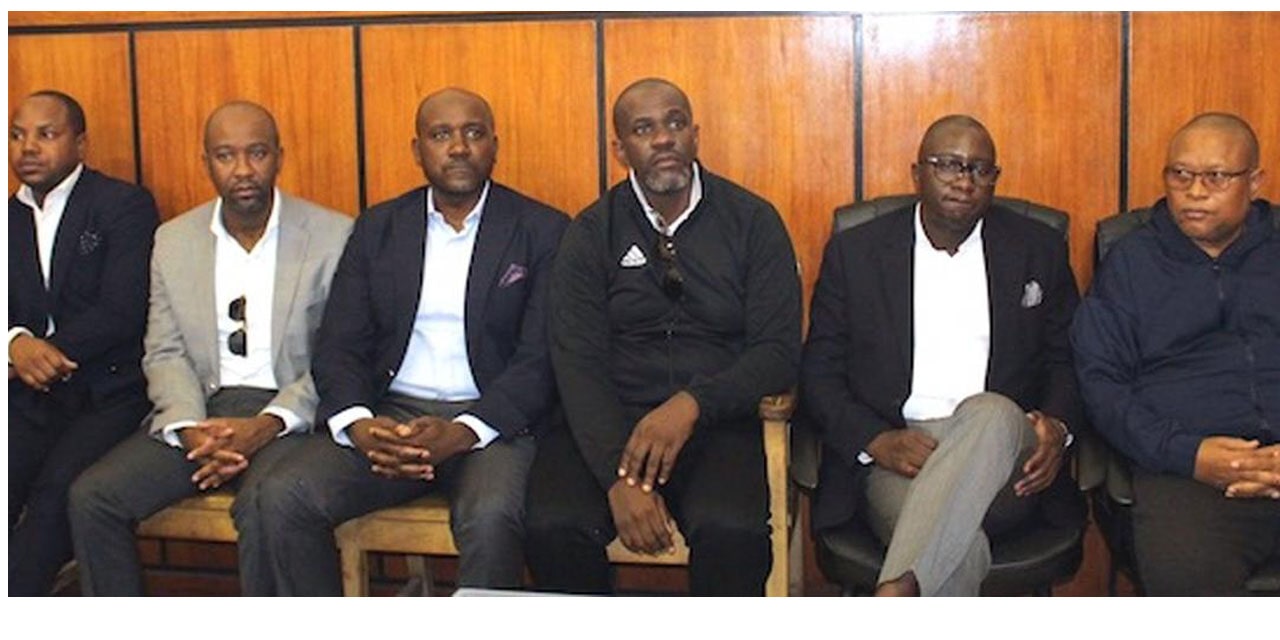Moses Magadza
The newly appointed minister counsellor and deputy head of mission at the Embassy of Sweden in Pretoria, Kristian Olsson Selerud, has hailed parliaments in the SADC region as the “beating hearts of democracy”.
He spoke on Tuesday during his first official visit to the secretariat of the Southern African Development Community Parliamentary Forum (SADC PF) in Windhoek, Namibia.
“If our parliaments don’t function, neither the executive nor the judiciary can do their work. Parliamentarians are there to represent and serve the people, and their role is indispensable,” Selerud told SADC PF staff at the Forum’s Secretariat and project researchers who joined online from across the SADC region.
He was accompanied by Veronica Perzanowska, counsellor, analyst, acting head of the sexual and reproductive health and rights (SRHR)team at the embassy of Sweden. He reaffirmed Sweden’s longstanding partnership with the SADC PF, which stretches back decades.
Sweden is the main supporter of the main Forum’s SRHR, HIV and AIDS Governance Project, currently in its third phase running from 2023 to 2026.
SADC PF secretary general Boemo Sekgoma said Sweden’s support to SADC PF has been impactful and has catalysed far-reaching reforms.
“These reforms are proof that parliaments can directly shape people’s lives when backed with strong laws and proper oversight,” she said.
Sekgoma said Sweden’s support remains a lifeline for SRHR in SADC.
She praised Sweden for its “longstanding and valued partnership” with the Forum and described the Nordic country’s support as the “last beacon” for advancing sexual and reproductive health and rights (SRHR) in the region.
She noted that Sweden’s consistent collaboration with the Forum since 2009 has been pivotal in entrenching parliamentary democracy and building regional policy frameworks.
“Thanks to the collaboration with Sweden, the Forum has been able to implement its SRHR mandate over the years. You have helped entrench parliamentary democracy and assisted parliaments at the regional level in developing a bill of rights and body of policies in SRHR, gender and others, which influence national policymaking,” she stated.
Sekgoma highlighted the current SRHR HIV and AIDS Governance Project (2023–2026) as a critical tool in advancing inclusive health and social justice.
The project, she explained, tackles pressing issues in the region, such as eradicating child marriages, eradicatinggender-based violence, ensuring universal access to SRHR services, good governance and accountability, human rights and preventing discrimination against key populations.
The project also supports the domestication of SADC Model Laws, including the Model Law on Gender-Based Violence and the Model Law on Public Financial Management, which Sekgoma said were crucial to good governance and democratic accountability.
A unique dimension of the project, according to Sekgoma, is its integration of climate action and gender mainstreaming.
“The SADC region is a flood-prone region where more than five countries have over 10% of their population exposed to floods, and this does not even include other weather events such as droughts,” she observed and stressed the need to ensure women’s and girls’ voices are not excluded from climate initiatives and disaster recovery strategies.
The SG underscored the role of the Sweden-supported project in keeping SRHR on the parliamentary agenda despite competing crises.
“Without this project, several domestic laws to prevent child marriage would not have been enacted, and budgets would not have been as responsive as they are today. I might even add that without this project in recent years, some governments would have prioritised Covid-19 and other ailments, completely discarding SRHR,” she said.
She added that the project had also fostered an unprecedented “symbiosis” between MPs, faith leaders, civil society organisations, and line ministries, creating a unified platform for advancing SRHR across the region.
Moreover, in a context marked by tariff conflicts inflating the cost of medicines and sanitary products and shrinking donor support, such as the erosion of USAID funds, Sekgoma said the project remains “the last lifeline” against mounting anti-rights pressures and hostility toward sexual minorities.
“The project continues to be a shield for SRHR advancement … In these circumstances, the project remains as the last beacon for SRHR in a region whilst daily, various factors interplay to make SRHR recede, if not vanish,” she emphasised.
She described the deputy ambassador’s visit as a testament to “the robust bonds of solidarity between the Forum and the Embassy of Sweden” and reiterated gratitude for Sweden’s belief in democracy, human rights and parliamentary cooperation.
Officials from SADC PF highlighted sweeping reforms and growing visibility of the project and credited Sweden’s support for helping parliaments across the region to translate model laws into tangible change.
Presenting an overview of progress, Dr Jacob Segale, SRHR and M&E project manager, said the project has been pivotal in strengthening legal frameworks and embedding SRHR in national agendas in SADC member states.
“The project strategically employs model laws to catalyse change in national legal frameworks,” he said and noted that Members of Parliament have been at the heart of legislative, oversight, budgetary, and representative interventions.
Between 2019 and 2024, 41 SRHR-related acts were passed in the region, while MPs held more than 186 public hearings and raised over 587 SRHR-related questions in national assemblies.
“From Malawi amending its Child Care, Protection and Justice Act to set the minimum marriage age at 18 to the Democratic Republic of Congo raising its health budget from 9.11% to 11%, the results show the catalytic effect of parliamentary action guided by model laws,” Dr Segale observed.
He added that although challenges remain, especially regarding LGBTIQ inclusion, “there is a decisive regional trajectory toward universal SRHR, driven by peer learning, robust oversight, and democratic accountability.”
On the communication front, the Swedish envoy heard that visibility had long been a concern for the Forum but has improved significantly in recent years.
“For years, the Sweden-supported SRHR Project grappled with limited visibility of its work. Today, results are encouraging. Newspapers and online media in Zambia, Zimbabwe, Lesotho, Botswana, Seychelles, Namibia, and Malawi now routinely carry our content once it is supplied in ready-to-publish format,” an official said.
The official explained that many outlets, both public and private, publish Forum content, amplifying its reach regionally and globally.
“These partnerships have significantly boosted the Forum’s visibility,” he stressed and presented data on digital performance, noting that the Forum’s website remains a trusted hub for parliamentary information.
In terms of transparency and accountability, Internal Auditor Mr. Samuel Bokosi and Project Accountant Mr. Raj Mahendrasing Khooblal informed the Swedish delegation about the Forum’s financial protections, which include regular outside audits, a whistleblower policy, and a regional oversight system managed by parliamentary clerks.
The latest external audit gave the project a clean bill of health.
Yapoka Nyirenda Mungandi, director of finance & corporate services at SADC PF, assured Selerud that Sweden’s financial support to the Forum was “in good hands” and being used for intended purposes. Selerud’s visit to the SADC PF happened only three weeks into his new posting. He urged the Forum and its partners to stay vigilant and guard democratic gains.
“Sweden remains a steadfast partner when it comes to democracy, human rights and institution-building.Globally we are seeing pushback on issues we once took for granted. The best thing we can do now is to prevent backsliding and to protect the hard-won gains in democracy, gender equality and human rights.”
He added that model laws are powerful tool for guiding parliaments across the SADC region.
“We will continue to walk this journey with you. Democracy thrives when parliaments thrive,” Selerud said.
-Moses Magadza (PhD) is the media and communications manager at the SADC Parliamentary Forum.




